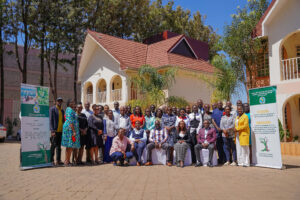Battling Fake Farm Chemicals
Agro Dealers must sell responsibly. Community leaders and the media must educate the public. Above all, farmers must protest and report fakes.

The Anti-Counterfeit Authority's 2025 national survey has once again confirmed what farmers know very well — agriculture is the most counterfeited sector. Photo/ KBC Digital
By Juliet Jerotich
In Kenya, every seed a farmer plants in the ground is a hope — hope for harvest, school fees for children, food on the plate, and honor through labor. That hope is under the greatest threat from counterfeit agrochemicals that promise to harvest but bring desolation.
The Anti-Counterfeit Authority’s 2025 national survey has once again confirmed what farmers know very well — agriculture is the most counterfeited sector. A whopping 89.16% of the respondents in the consumer-level survey reported agricultural inputs, and specifically pesticides and herbicides, as the most prevalent fakes they encounter. The figure is not a statistic, it’s a warning.
In rural regions such as Bungoma, Meru, Machakos, and Makueni, fake goods packaged to resemble genuine brands are being sold at low prices by unregulated outlets. They contain no active constituents or poisonous ingredients that kill soils and crops. The effects are catastrophic: loss of crops, bulk returns in terms of finances, food insecurity, and growing wrath compelling some farmers to abandon farming.
The problem goes beyond affecting farmers only. The factory owners and authorized distributors report increasing entry of spurious goods into supply chains and retail outlets. This leads to huge losses in revenue and, worse still, loss of confidence. When the spurious ones also malfunction, farmers lose faith in the originals, the retailers lose their integrity, and national food security is compromised.
Whereas awareness of counterfeits is high — 83.85% of Kenyans report being aware of the problem — reporting is astonishingly low. Over a third of consumers fail to report counterfeit products because they believe that nothing can be done, and a further 26.86% just do not know how or where to report it. Silence is fertile ground for counterfeiters, especially where informal trade is common.
Informal markets, kiosks, and street stalls — the primary sources for nearly all rural farmers — account for 60.48% of the sales of counterfeit agrochemicals. Left unregulated, these networks are pipelines for fakes. Recovery is typically impossible by the time the damage is seen.
Kenya loses a conservative Ksh 153 billion every year to fake goods, with agriculture being one of the most affected sectors. The losses are not just financial. They touch the farmer whose crop fails, the child who stays away from school because of unpaid fees, and the family that goes hungry.
To fight this crisis, there is a need for concerted efforts. The ACA, Ministry of Agriculture, Kenya Bureau of Standards, Kenya Revenue Authority, and the law enforcement are increasing inspections, seizing contraband goods, and prosecuting offenders. Public campaigns, farmers’ training, and mobile product verification equipment are also being rolled out.
But not enough is done in terms of enforcement. Manufacturers must safeguard packaging and secure supply chains. Agro Dealers must sell responsibly. Community leaders and the media must educate the public. Above all, farmers must protest and report fakes.
Agriculture is Kenya’s economic backbone. It must be shielded from fakes agrochemicals — time to act now.








